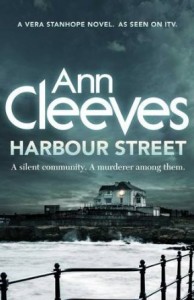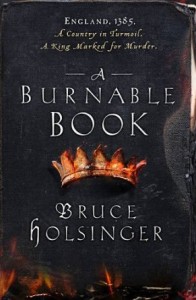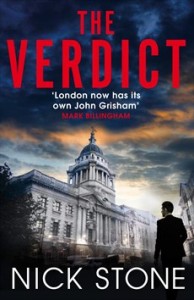 Harbour Street by Ann Cleeves, published by Macmillan UK
Harbour Street by Ann Cleeves, published by Macmillan UK
The Killer Next Door by Alex Marwood, published by Sphere UK
A Burnable Book by Bruce Holsinger, published by HarperCollins UK, William Morrow US
The Verdict by Nick Stone, published by Sphere UK
Winter punishes the innocent and guilty alike with its cold and wet and gloom, but the denizens of the guest house in Ann Cleeves’s Harbour Street have a tougher time than most as the snow begins to fall. This guesthouse is benevolently run by divorced Kate with the help of Margaret, a widow with a mysterious past. When Margaret is murdered on the Newcastle metro one day, Kate’s hardworking but satisfactory life is splintered into a mess of fear and suspicion. The crime is investigated by DI Vera Stanhope and Joe Ashworth, her sergeant, with all the common sense and eccentricity that have become so popular in the televized versions of the novels. There is no shirking of the miseries and cruelties of real life in this series, but Cleeves displays them without resorting to any graphic violence. She has always rendered the landscape and inhabitants of the North East of England with a quiet skill but there is a sense of expansion in the writing of Harbour Street and a confidence that make it even more appealing than its predecessors.
 Long before her death, Margaret earned some much-needed money as a sex-worker, as does Alex Marwood’s Cher in The Killer Next Door. Cher is a fifteen-year-old runaway from Toxteth, now living in a horrible converted house in a south London suburb. Her fellow lodgers include the elderly Vesta, who has been marooned in the area as her circumstances have changed, a night-club manager on the run, an Iranian asylum-seeker, and tedious Thomas Dunbar. The landlord is a disgusting individual, preying on the vulnerable and secretly filming his lodgers so that he can masturbate to the sight of them in the bathroom. He takes no care of the fabric of the house, refusing even to get Dyno-Rod to clear the revolting blocked drains, and actively damages Vesta’s flat in the hope of getting her to move out.
Long before her death, Margaret earned some much-needed money as a sex-worker, as does Alex Marwood’s Cher in The Killer Next Door. Cher is a fifteen-year-old runaway from Toxteth, now living in a horrible converted house in a south London suburb. Her fellow lodgers include the elderly Vesta, who has been marooned in the area as her circumstances have changed, a night-club manager on the run, an Iranian asylum-seeker, and tedious Thomas Dunbar. The landlord is a disgusting individual, preying on the vulnerable and secretly filming his lodgers so that he can masturbate to the sight of them in the bathroom. He takes no care of the fabric of the house, refusing even to get Dyno-Rod to clear the revolting blocked drains, and actively damages Vesta’s flat in the hope of getting her to move out.
Marwood offers little mystery, describing the activities and thoughts of the title’s killer in clear detail, but she has plenty of surprises to shake her readers as the action gallops forward. While some of the landlord’s most repellent aspects are described in more vivid detail than sometimes seems necessary, Marwood injects into this dark tale an amazing amount of human warmth, and her ending provides pure pleasure.
More sex-workers fill the pages of Bruce Holsinger’s first novel, A Burnable Book, but these pre-date Marwood’s by six centuries. What hasn’t changed throughout that time is the vulnerability of the women who are forced by bad luck to earn their money from servicing the inadequate, the lonely, the violent, and the plain bad. Holsinger’s women of Gropecunt  Lane in medieval London become embroiled in the hunt for a stolen book, which is believed to include treasonous prophecies of the death of King Richard II. The great and not-so good who control the kingdom are determined to retrieve the book. They care nothing for the safety of the women who are believed to be hiding it, and not much for each other. Conspiracies grow and people suffer tortures and die.
Lane in medieval London become embroiled in the hunt for a stolen book, which is believed to include treasonous prophecies of the death of King Richard II. The great and not-so good who control the kingdom are determined to retrieve the book. They care nothing for the safety of the women who are believed to be hiding it, and not much for each other. Conspiracies grow and people suffer tortures and die.
Holsinger is a medieval scholar, who carries his learning easily. He also deals well with the historical novelists’ familiar problem of how to include real characters (in this case Geoffrey Chaucer and his sister-in-law Katherine Swynford, as well as the king and his relations) amid the invented plot. Another challenge is how to pitch the language in a novel set so long ago. The writer must avoid melodramatic archaisms, while still rendering the dialogue in a style that doesn’t clash with the ideas of the time and so make those ideas seem absurd. I enjoyed Holsinger’s descriptions of life in London, and I only wish that I found his first-person narrator, the poet John Gower, more likeable.
Conspiracies also fill Nick Stone’s involving legal thriller, The Verdict. His hero is Terry, who dropped out of his Cambridge law degree course and now, twenty years later, works as  a lowly solicitor’s clerk in London. Life at home is good, but he has still not recovered from the disaster of his failures at Cambridge and betrayal by his best friend Vernon, who is now a multi-millionaire. When Vernon is accused of murder and Terry finds himself working on the defence case, the stage is set for a revenge drama of almost Jacobean proportions. But Stone is too clever for anything obvious, and his account of Terry’s battles with his client, his employers, the prosecution lawyers, and some serious muscle provides plenty of surprises. Set against the London riots of 2011, this is a powerful exploration of the destructive power of rage as well as a gripping thriller.
a lowly solicitor’s clerk in London. Life at home is good, but he has still not recovered from the disaster of his failures at Cambridge and betrayal by his best friend Vernon, who is now a multi-millionaire. When Vernon is accused of murder and Terry finds himself working on the defence case, the stage is set for a revenge drama of almost Jacobean proportions. But Stone is too clever for anything obvious, and his account of Terry’s battles with his client, his employers, the prosecution lawyers, and some serious muscle provides plenty of surprises. Set against the London riots of 2011, this is a powerful exploration of the destructive power of rage as well as a gripping thriller.
